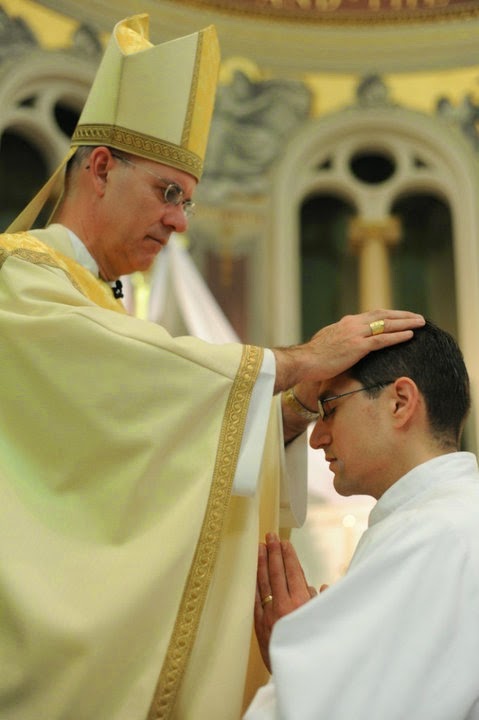We like to reduce things to signs and symbols. It’s convenient. Symbols simplify communication and are useful in teaching. The message behind the sign is usually much greater or deeper than the sign itself. For example, what does this sign mean? (I love you.) (Touchdown – Ben Roethlisberger to Hines Ward.) (Peace/Sign of Peace at mass.) (Blessed Trinity/Two natures of Jesus Christ.)
Our Creed is a symbol, it contains within it the most central and highest mystery of our faith, the Blessed Trinity. I believe in God, the Father…in Jesus Christ…the Holy Spirit…, but these are not a bare minimum for our faith. They represent much more.
It is correct to say that “the faith of all Christians rests on the Trinity.” It is the mystery of God in himself and is therefore the source of all the other mysteries of faith, the light that enlightens them. It is the most fundamental and essential teaching in the "hierarchy of the truths of faith". We cannot arrive at this knowledge by human reason alone. Before the Incarnation of Jesus Christ, even Israel did not understand God as Trinity even though he left traces of his Trinitarian work of creation and in his Revelation throughout the OT.
What is the Trinity? The Trinity is an eternal dialogue of love. Not a selfish love. God is one, but he is not alone. Father + Son + Holy Spirit = an eternal community of love. Through the revelation of the Trinity, we know that love is generative, it gives of itself, it produces fruit, it seeks the other, it goes outside of itself. The love of God is the primary cause of our existence. We exist because God loves us and willed us to exist. He did not need us – we add nothing to him nor does anything we do detract from who or what God is.
Which brings us to the second most fundamental and essential teaching of our faith, the incarnation of the Son of God. In the fullness of time, God chose to complete the revelation of himself to Israel and all who would believe, through His only-begotten Son. A human person who was also divine in nature. We call this the “hypostatic union”. (Show the hand sign.) In Christ, the divine nature of the Son remained undiminished by his human nature and his human nature remained complete and unabsorbed by his greater divine nature. There was not a new third nature created in Jesus. Rather, it is a union, like marriage, in which the two remain distinct as individuals, but are now bound to one another in one person.
Through the Incarnation, we learn that God refused to abandon his creation even though it had fallen into sin. From all eternity, he chose to bind himself to our human nature in time and restore to us our original dignity and reveal our purpose to live in a communion of love with him forever in heaven,
We know God by his actions. One of Jesus primary missions was to reveal the Father. To show us who and what the Father is. That is why today’s Gospel is so important to Trinity Sunday and our understanding of God.
God so loved…that he gave. (We know God by his actions.) This is perhaps one of the most famous passages of scripture. John 3:16. Love is generative. It gives of itself. It seeks the other. John 3:16 is often used as a symbol representing the entire gospel. Unfortunately, this too is often misused as a bare minimum for faith, and worse, for excluding others from the possibility of being saved.
God knows us by our actions, also. Through the Son of God, we know what is required of us when we say that “we believe”. Belief goes beyond simple assent. The Son does not simply receive the love of the Father, he acts on it. He does what the Father tells him. HE ALSO GIVES. The Father gave the Son, the Son give us himself in obedience to the Father, and the Son gives himself back the father through obedience. Love is not a feeling – love is an action and requires a response. If we do not receive and respond, the love bears no fruit.
As symbols, the Creed and John 3:16 are not intended to be the bare minimums of faith for us. They are meant to be symbols of all that we believe to be revealed by God through His Church. Now more than ever we are without excuse if we are ignorant of the faith and if we don’t know why the Church teaches what it teaches to be part of that revelation. Baptized in the name of the Father and of the Son and of the Holy Spirit, having the benefit of an education, we have every obligation to respond to the love God has freely poured into our hearts. We must use human reason and everything he gave us through the Catholic Church: Scripture, Tradition, the Sacraments – to act in obedience and return the love we have in the Holy Spirit, through Jesus Christ, to the Father. In order to this, I pray in the words of Saint Paul: May the grace of the Lord Jesus Christ and the love of God and the fellowship of the Holy Spirit be with all of you.
Sunday, June 19, 2011
Subscribe to:
Posts (Atom)
